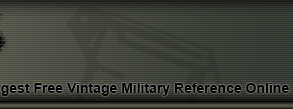|
WWII JAPANESE ARMY KATANA SAMURAI SWORD - #15
The Katana was developed during the Momoyama period. It was designed to allow the Samurai to
fight from horse back. The length of the blade is typically over 24 inches up to around 30
inches.
This is a WWII Japanese Army Katana. The scabbard is of metal construction with a single suspension ring that was
used for the purpose of attaching the sword to the belt. The scabbard is Painted with the Japanese Imperial
army Brown color. The tip of the scabbard is capped with a metal fitting bearing the chrysantemum symbol.
The menuki is missing from the handle.
The top of the handle has a metal cap with an elongated hole. This is where the lanyard ring would be placed. This
sword is the classical example of the type issued to the Japanese armed forces.

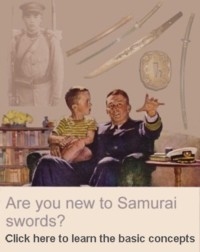
|
The Samurai sword has a very rich history. The sword has been manufactured for several centuries and continues
to be produced today. The sword represented more than just a weapon. It was the soul of the Samurai warrior.
When attempting to identify the type of sword you have It is important to keep in mind that the fittings of
a sword (scabbard, handle, crossguard. etc.) may be identical from one sword to another. The reason why is
because during WWII the same fittings were used in all Army swords, Navy swords, etc. Armed forces are all
about uniformity. They strive to make everything the same.
This is the reason why a sword cannot be identified merely by its external appearance.
Understanding the different components that make up the Samurai sword is the first step in figuring out the
type of sword you have. That is the reason why we have created the
Understanding the Samurai sword section as a means to
provide a novice with the basic knowledge to start the path of determining the questions everyone has;
who made the sword, how old it is nad how much it is worth.
|
The tang of the sword has both, painted and inscribed markings. The painted marks usually indicate production
numbers from the factory. The colors of paint used more regulary include red and green.
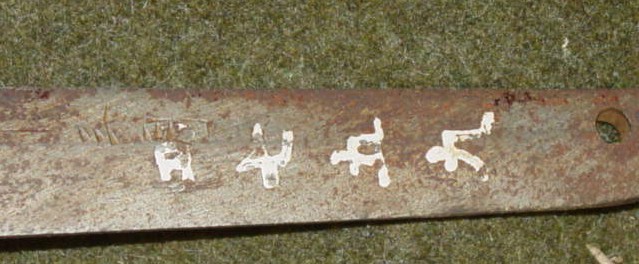
|
This page is a recognition and identification guide for Samurai swords.
Multiple detailed photos of a specific sample are provided. Descriptions point
out clearly defined points that should be noted.
One of the most commonly asked questions is "How much is my Samurai Sword worth?".
A price guide is included here to address this question. The value of the swords is
reviewed over a period of several years. A trend can be observed. The present worth
of the edge weapons in the collector's market is illustrated.
This service is provided free of charge to the visitor/enthusiast courtesy of
MilitaryItems.com,
a company dedicated to the preservation of military history and to providing quality
military antiques and collectibles to museums, institutions and the general public.
|
|
The following pictures illustrate some of the markings engraved on the tang. Information may include the date of
manufacture, the town or school and the name of the maker. It is important to note that not all swords were
signed. Usually the signature indicated that the swordsmith was satissfied with the quality of the blade.
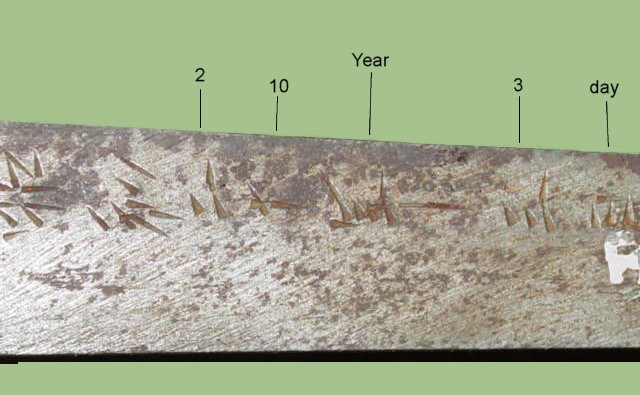
The shape and size of the Tang can help determine the school who produced the blade. The tang on this sword
has two holes, one near the base and one near the top. These holes is where the wooden pegs rest in order to
secure the handle to the sword.
The photo below has the signature of the sword maker.
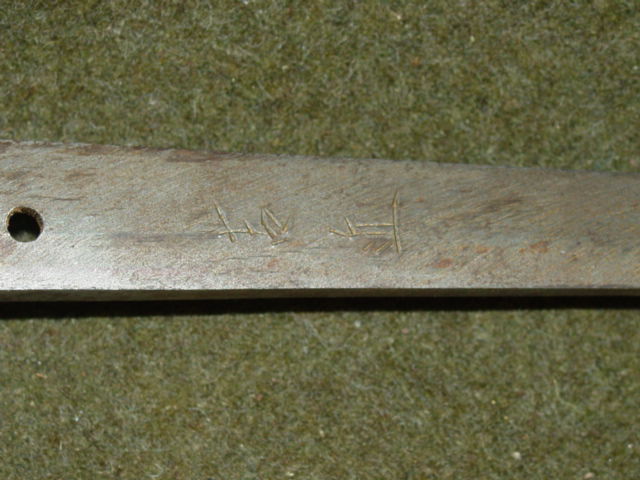
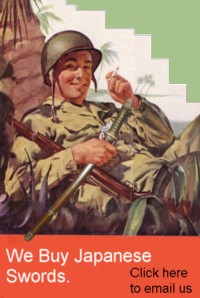
|
WE BUY JAPANESE SWORDS - All types of Japanese edge weapons. Whether it is a WWII era Samurai sword or an
older type of blade.
The process gets started by you sending us an
Email .
We will respond to your inquiry normally within 24 hours and in many cases much faster.
We can tell you what you have, what it is worth and how much we can pay you.
One sword or an entire collection -
Email Us .
|
 |
The tsuba is of oval shape and of plain design. Two openings are present. one if for the blade and the other is for
the locking mechanism. This Tsuba is the typical design for combat swords during WWII. It is interestnig to note
that a Seki stamp has been placed on one side.
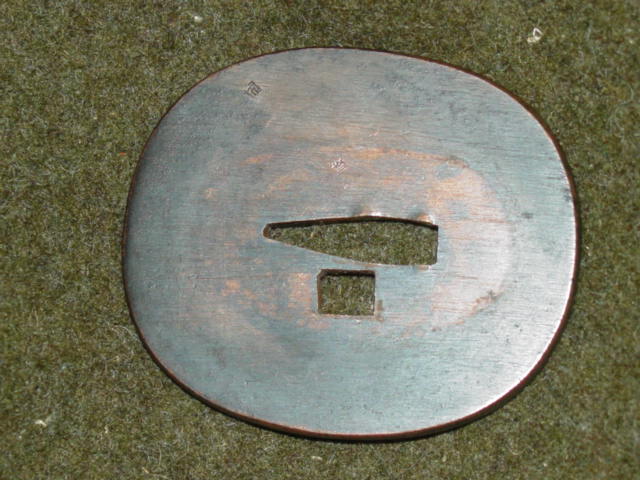
The tsuba bears the arsenal stamp. Not all tsubas were stamped. The Tsuba served dual purposes. one was purely
aesthetic, to adorn the sword as to make it more attractive. The second purpose was more practical. To
protect the hand of the warrior from an incoming strike.
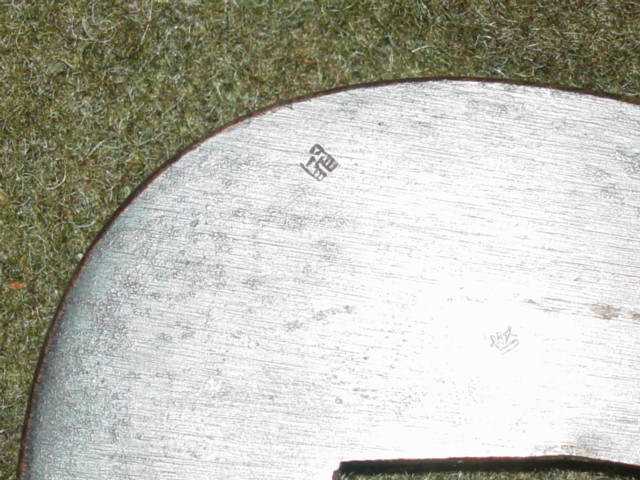
By the Numbers
It is next to impossible to determine the exact number of Samurai swords that were produced and issued to
Japanese soldiers during the war. However, thanks to the record keeping maintained by the US Armed Forces,
it is possible to estimate how many swords were actually shipped home.
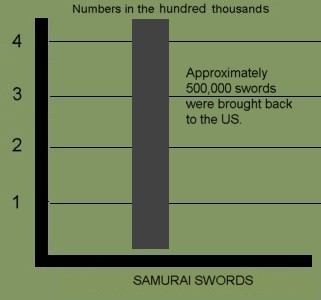 |
There were over 500,000 Samurai swords were brought back home as souvenirs from the war.
There are several caviats to this number.
|
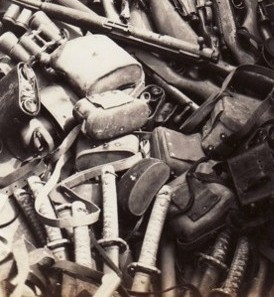 |
For example, some soldiers took souvenirs and shipped them home circumbenting the established process.
Some of the swords were brought back inside duffle bags without anyone knowing except for the soldier who
captured the sword. This fact would clearly affect the final count.
The number also does not account for swords that were taken by Allied soldiers from other countries.
Collecting Samurai swords
Collecting Samurai swords is a field that has been growing since the days the GI's rummaged around Asia
bringing back military souvenirs. Japanese soldiers carried many of these swords when they went to
battle. Once the soldier was killed or captured, the Americans would take the edge weapons as war trophies.
Eventually all these pieces came back to the United States where military history enthusiasts began to collect them.
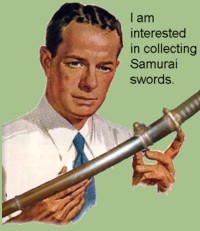 |
In trying to determine if you should collect Samurai swords there are certain factors that should be
considered.
The adjacent table outlines some of the advantages and disadvantages of collecting the Samurai swords.
|
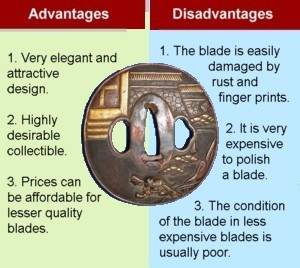 |
This Samurai Sword may be currently reproduced.
It is becoming more difficult to be able to tell the fake ones from the real ones because
the quality of the reproductions is improving. The collector must become familiarized with
the construction style and materials employed in the manufacturing of this item.
Attention to the details is critical in order to be able to determine the authenticity of
the collectible.
If you have an interest is seeing other Japanese Samurai swords, you can do so by going to our
Japanese Samurai Swords Price Guide
identification guide. Where we cover Samurai swords from all periods.
| 

